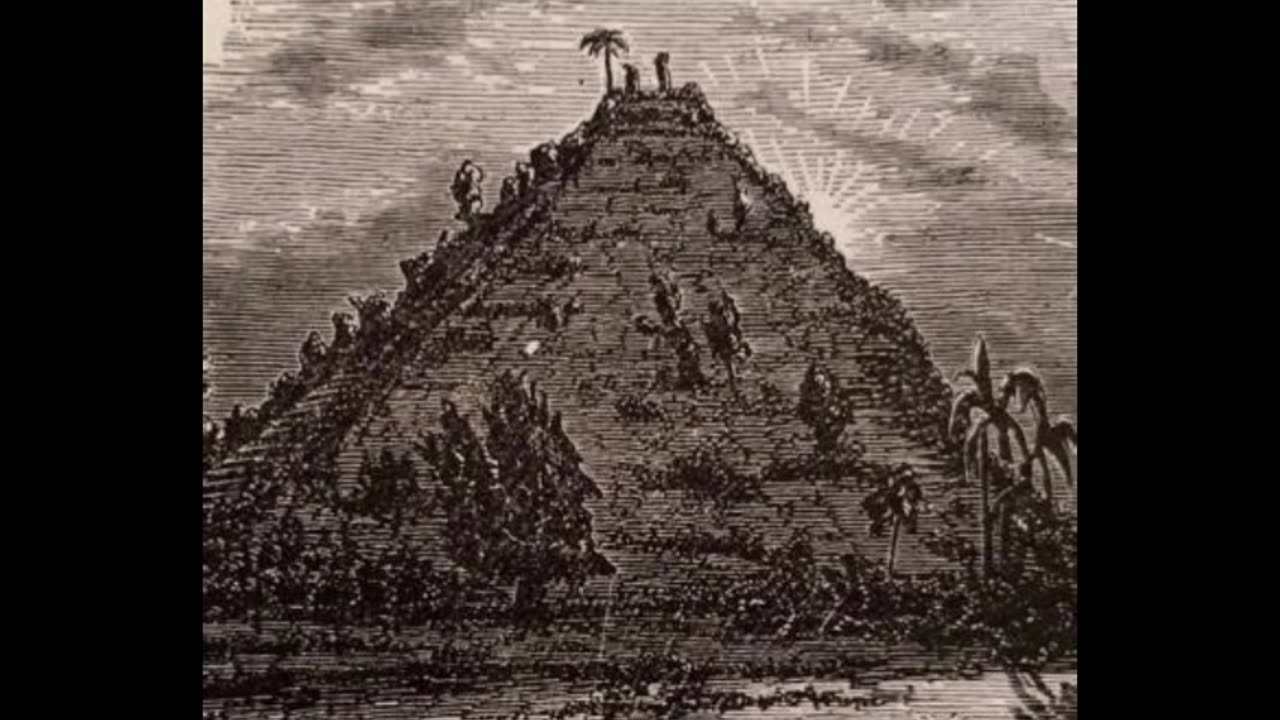Premium Only Content

Atlantis: The Antediluvian World by Ignatius Loyola Donnelly (1831 - 1901)
Atlantis: The Antediluvian World by Ignatius Loyola Donnelly, first published in 1882, is a seminal work that argues for the historical existence of Atlantis, a lost civilization described by Plato. Donnelly presents the idea that Atlantis was a highly advanced civilization that served as the origin of many ancient cultures and technologies found across the world. He proposes that Atlantis was the source of various myths, legends, and religious traditions and that its destruction led to a global dispersion of its people, influencing civilizations in Egypt, Mesopotamia, and the Americas.
Donnelly uses a wide array of geological, mythological, and linguistic evidence to support his hypothesis. He explores topics such as flood myths from different cultures, the similarities between ancient languages, and the architectural and technological parallels between distant civilizations. The book had a significant impact on later theories about Atlantis and contributed to the popularization of the idea that such a lost continent once existed.
List of Chapters and Key Concepts:
1. The Purpose of the Book - Introduction to the concept of Atlantis as a historical reality.
2. Plato’s History of Atlantis - Analysis of Plato’s accounts of Atlantis from *Timaeus and Critias.
3. The Probabilities of Plato’s Story - Arguments supporting the likelihood that Plato’s description was based on real events.
4. Was Such a Catastrophe Possible? - Examination of geological evidence suggesting the possibility of a sudden destruction.
5. The Testimony of the Sea - Oceanographic studies indicating the remnants of a submerged landmass.
6. The Testimony of the Flora and Fauna - Comparisons of plant and animal species across continents, suggesting a common origin.
7. The Corroborating Testimonies of Ancient Histories - Evidence from various ancient texts that align with the Atlantis narrative.
8. The Deluge Legends - Examination of flood myths from different cultures as evidence of a shared historical event.
9. The Destruction of Atlantis Described in the Deluge Legends - Specific connections between the Atlantis narrative and global flood stories.
10. The Civilization of the Old World and New Compared - Similarities between ancient civilizations across different continents.
11. The Bronze Age in Europe - Connections between European Bronze Age cultures and Atlantis.
12. Artificial Deformation of the Skull - Cultural practices shared between ancient civilizations as possible remnants of Atlantean influence.
13. The Origin of Our Alphabet - Linguistic analysis tracing modern alphabets to a common ancient source.
14. The Atlantis and the Old World Religions - The influence of Atlantean culture on religious traditions.
15. The Colonies of Atlantis - Hypotheses regarding the global dispersal of Atlantean survivors.
16. The Gods of the Phoenicians - Connections between Atlantean figures and deities in other mythologies.
17. The Oldest Colony of Atlantis - Egypt as a possible surviving colony of Atlantis.
18. The Growth of Mythologies - The evolution of myths rooted in Atlantean history.
19. The Kings of Atlantis Become the Gods of Greece - The transformation of Atlantean rulers into Greek deities.
20. The God Odin, Woden, and Adon - Norse and Semitic gods as derived from Atlantean traditions.
21. The Pyramid, the Cross, and the Garden of Eden - Symbolism in global religious traditions tracing back to Atlantis.
22. Atlantis Reconstructed - A speculative reconstruction of Atlantean society.
23. The Antediluvian World in the Bible - Connections between Atlantis and the biblical narrative of early human history.
Atlantis: The Antediluvian World remains an influential book in the realms of alternative history and speculative archaeology. While many of Donnelly’s ideas have been debunked by modern science, the book continues to captivate readers interested in the mysteries of ancient civilizations and the possible reality behind the Atlantis legend.
About the Author:
Ignatius Loyola Donnelly (1831-1901) was an American politician, writer, and amateur scientist whose ideas have had a lasting impact on fringe theories, particularly in the realms of lost civilizations and alternative history. Born in Philadelphia, Donnelly was a man of diverse talents and interests. He was a lawyer by training, a progressive reformer in politics, and a fervent advocate for social change, but he is best remembered today for his work in speculative history and his contributions to the Atlantis legend.
Donnelly’s career began in law and politics, where he rose to prominence as a reformer and advocate for the underprivileged. He served as the Lieutenant Governor of Minnesota and later as a member of the U.S. House of Representatives. His political writings often focused on economic reform, particularly regarding the rights of farmers and laborers. However, it was his fascination with ancient history and mythology that would lead him down the path of authorship, culminating in his most famous work, Atlantis: The Antediluvian World.
In this groundbreaking book, Donnelly proposes that the lost civilization of Atlantis, described by Plato, was not only real but was also the cradle of all subsequent human civilization. He argues that the sudden destruction of Atlantis by a cataclysmic event led to the dispersion of its people, who then seeded advanced knowledge and technology across the globe. According to Donnelly, this explains the remarkable similarities between ancient cultures separated by vast oceans, such as the Egyptians, Mesopotamians, and the Mesoamerican civilizations.
Donnelly’s theories were revolutionary for his time. He approached the Atlantis narrative with the rigor of a historian and the imagination of a novelist, blending geological, linguistic, and mythological evidence into a compelling narrative. His work has been credited with sparking renewed interest in the idea of Atlantis, influencing generations of researchers, writers, and enthusiasts. Although many of his claims have since been debunked by modern archaeology and geology, Donnelly’s work remains a cornerstone in the study of lost civilizations and speculative history.
Beyond Atlantis, Donnelly authored several other influential books, including Ragnarok: The Age of Fire and Gravel, in which he hypothesized that a comet impact caused widespread destruction and shaped human history, and The Great Cryptogram, where he controversially claimed that Sir Francis Bacon was the true author of Shakespeare’s works. His willingness to challenge orthodox narratives and explore unconventional ideas made him a polarizing figure, both admired and criticized in equal measure.
For those interested in the mysteries of ancient history and the enduring enigma of Atlantis, Donnelly’s Atlantis: The Antediluvian World is essential reading. It offers a unique blend of scholarship, imagination, and storytelling that remains influential in discussions about lost civilizations. His work stands out not just for its content but for the depth of research and the boldness of his ideas. Donnelly’s synthesis of myth, history, and science presents a captivating narrative that continues to intrigue and inspire those who seek answers to humanity’s ancient past.
-
 3:59:19
3:59:19
Deus Meum Que Jus
2 months agoThe Kybalion: A Study of the Hermetic Philosophy of Ancient Egypt and Greece By: The Three Initiates
969 -
 LIVE
LIVE
The White House
2 hours agoPresident Trump Hosts First Cabinet Meeting, Feb. 26, 2025”
2,219 watching -
 DVR
DVR
The Dan Bongino Show
2 hours agoShake-Up In The White House Press Room (Ep. 2431) - 02/26/2025
329K455 -

The Rubin Report
1 hour agoDem Looks Visibly Angry as Stephen A. Smith Points Out Failures to His Face
9.2K8 -
 LIVE
LIVE
Benny Johnson
1 hour ago🚨 FBI Launches INVESTIGATION Into James Comey for Illegal Spying on Trump | WH Cabinet Meeting LIVE
9,223 watching -
 LIVE
LIVE
Steven Crowder
3 hours ago🔴 Trump Keeps Delivering | This Week’s 3 Big Wins Explained
31,552 watching -
 LIVE
LIVE
LFA TV
15 hours agoFLUSHING THE TURDS! | LIVE FROM AMERICA 2.26.25 11AM
4,304 watching -
 1:07:54
1:07:54
Timcast
2 hours agoTulsi FIRED 100+ Deep State PERVS After Fed Kink Chat EXPOSED, Trump CLEANS HOUSE | Timcast LIVE
100K24 -
 LIVE
LIVE
Bannons War Room
8 days agoWarRoom Live
20,180 watching -
 LIVE
LIVE
House Committee on Energy and Commerce
4 days agoO&I Hearing: Examining the Biden Administration’s Energy and Environment Spending Push
245 watching